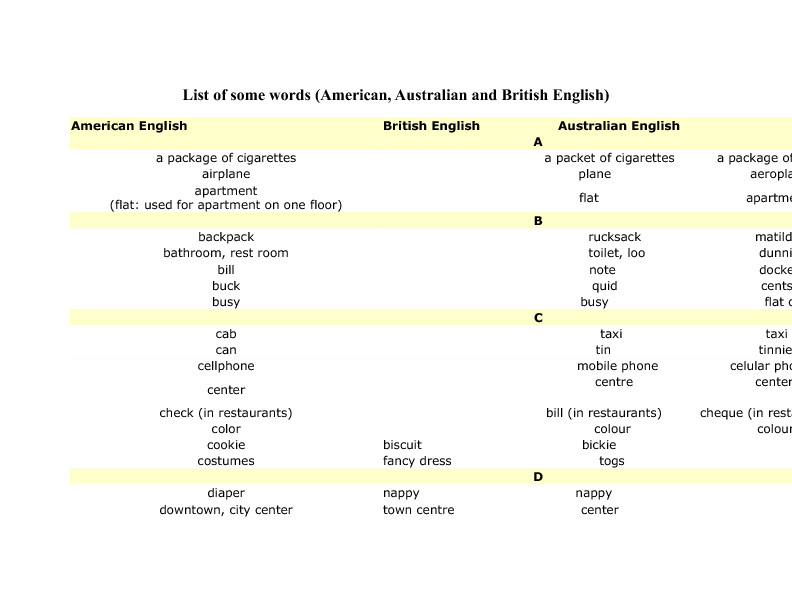British english american english words
TV, radio) antenna, aerial. It’s not just spellings you need to watch out for though! The US and the UK do have a lot in common, including our language. Yet, some words have completely different meanings once you travel over the pond.
Short answer, vocabulary. They often use different spelling or even completely different terms to describe the same thing. The most popular dictionary and thesaurus.
The main reason is Noah Webster, the man behind the first grammar schoolbooks and the Webster Dictionary. CORIANDER vs CILANTRO. Chop the coriander leaves and mix with the ginger. In the UK, the past participle of “get” – “gotten” – is considered archaic and was replaced with “got” some time ago.
American English ” is a dialect of English. A Divided English Language. Words, phrases, and slang can mean one thing in the UK and a completely different thing in the US, and vice versa. Because it is used in many countries, there are many differences in this language.
Although English is the common point of the USA and the UK, there are some differences between these two versions. Sometimes a word spoken.

If you’re using a mix of UK- English and US- English study materials, it can be useful to learn which words are specific to each country. Here’s a quick rundown of common terms with different meanings on either side of the Atlantic, and a few explanations of some common phrases. They can be any “chips” from Doritos to.
British English vs. I have documented many mispronounced words, however this entry concentrates on words you are probably saying correctly, as there are two ways to say them.
We use collective nouns to refer to a group of individuals. In the earlier 20th century, the word “bit” was slang for a coin, and the word “bob” was slang for a shilling. Meaning: to make fun of someone, to tease them a lot.
Both of them are having their own uniqueness and characteristics in terms of word choices. This spelling is a reflection of the French spellings of the words from which they were derived.
This use of the word comes from one meaning of the word ‘bang’ which means ‘abrupt’, as a full fringe cuts across the forehead quite abruptly, creating a strong line. It turns out people have been picking their noses for boogers for a long time, as the word has been traced. Naff is used to describe something uncool or silly-looking (That dress is so naff!). A “roundabout” is called a “traffic circle”.
We thought it would be fun to put together a list of the major words that have a completely different meaning in the UK. Write words in the gaps depending on where the speaker is from.
It was getting near lunchtime and I needed some (1) _____, so I left the (2) _____ and drove towards the nearest town. There are clues at the bottom to help you.
You might see these pop up in spellings that have the suffix -able at the end. Heading in the right.
However, it’s worth noting that the adjectival forms of these words are spelled with an ‘s’ in both UK and US English (e.g. ‘defensive’, ‘offensive’).
Yorumlar
Yorum Gönder